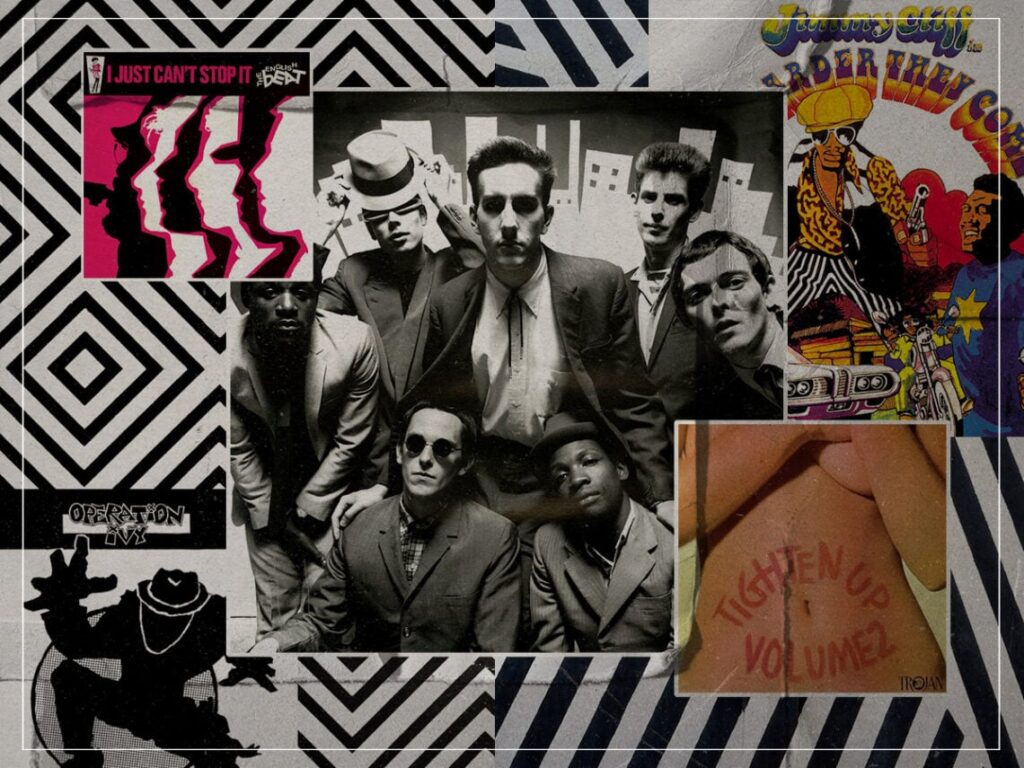Five Easy Masterpieces: an introduction to ska music
 Posted On
Posted On
(Credits: Far Out / The Specials / Album Covers)
Ska music is perhaps the most misunderstood genre in music history. What is so often viewed as blaring horns and odd-looking dance moves actually has an incredibly important and varied history. From its roots in American R&B, ska has soundtracked Jamaican independence, Thatcherite Britain, and even the skateparks of 1990s America. Given that the genre is so broad, spanning multiple styles and time periods, it can often be difficult to know where to start when it comes to ska but do not fear, help is at hand.
In a general sense, ska can be categorised into three predominant eras: ‘traditional’, 2 Tone, and third wave. The first wave of ska – often reductively referred to as ‘trad ska’ – is undoubtedly the most important era for ska music. After all, it was the era that introduced the distinctive sounds of ska to the airwaves. Arising from sound system culture and local music scenes in Jamaica, ska was the result of a search for the island’s national sound. Artists like Prince Buster and Jimmy Cliff took inspiration from American blues and R&B, incorporating those styles with a distinctive Jamaican twang.
The resulting records were utterly infectious, characterised by off-beat rhythms and wondrous brass instruments. These early ska records soon found their way to the UK and Europe as a result of post-war immigration to Britain. Soon, young people in Britain were gripped by the sounds of Jamaica, spawning the early skinhead subculture and inspiring the next generation of music makers. In the wake of punk, artists like The Specials and Madness took these old-school ska records and imbued them with punk sensibilities, thus establishing the 2 Tone movement.
One of Britain’s most important music scenes, 2 Tone enjoys a lasting legacy to this day, despite the actual record label that the movement took its name from being fairly short-lived. The popularity of the scene saw ska head overseas, finding favour in Japan, mainland Europe and the USA, among many other places, thanks largely to the release of the concert film Dance Craze. Those who were inspired by 2 Tone formed their own off-shoot of ska, dubbed ‘third wave ska’, leaning into the punk aspect of earlier scenes and regrettably resulting in a lot of novelty ska bands.
Although ska no longer enjoys the kind of mainstream popularity that it witnessed during the third wave or even the 2 Tone period, it has never lost its relevance. Ska music is vitally important within the cultural heritage of both Jamaica and the United Kingdom, and as such, it will never truly be forgotten among dedicated music fans and cultural historians. So, with that in mind, allow us to guide you through five essential ska records from throughout the long history of the genre.
Five essential ska masterpieces:
Various Artists – Tighten Up, Vol. 2 (1969)
Including a compilation album in this list might seem like something of a loophole, but the series of Tighten Up compilations released by Trojan Records were vitally important in establishing the genre in the UK. The second volume of Tighten Up features some of the most iconic releases in the early period of ska and rocksteady music, including tracks by the likes of The Pioneers, Dandy Livingstone, and Lee ‘Scratch’ Perry’s The Upsetters.
These compilation records provided a cheap way for working-class kids in Britain to sample the sounds of ska and were instrumental in fostering the blossoming skinhead subculture during the late 1960s. If you are looking for an introduction to the early sounds of ska and skinhead reggae, then volume two of Tighten Up is an unavoidable choice.
Jimmy Cliff – The Harder They Come (1972)
Jimmy Cliff is a vitally important pioneering figure within the early days of ska, and he is perhaps best remembered for his work on the film The Harder They Come. Featuring Cliff in the starring role, the film offers an insight into the post-independence era of Jamaica, and the surroundings in which ska music was allowed to blossom. As such, the soundtrack album which accompanies the film is essential listening.
Much of the album is made up of Cliff’s own compositions, which sound as stunning today as they did 50 years ago but also feature some legendary figures from the early ska period – namely, Desmond Dekker, The Maytals and The Melodians. The record is vitally important in understanding the cultural importance of ska music within the island of Jamaica.
The Specials – Specials (1979)
The inclusion of The Specials on this list should come as no surprise; the Coventry band blazed the path for the emergence of 2 Tone and ska-punk. With keyboardist Jerry Dammers founding the 2 Tone label and fostering the scene which produced the likes of The Selecter, Madness and The Bodysnatchers, few bands had as important a role in the development of the ska genre as The Specials.
Releasing their first record in 1979, The Specials wasted no time in establishing themselves as a politically-charged group. Songs on Specials detail themes of the welfare state, the rise of the far-right and widespread racist attitudes. In addition to these punk-influenced songs, the band also paid tribute to their early influences on this album, covering tracks by Dandy Livingstone, Prince Buster and Toots & the Maytals among others.
The Beat – I Just Can’t Stop It (1980)
Brothers-in-arms with The Specials, The Beat were a force to be reckoned with during the 2 Tone years. As opposed to their Coventry counterparts, though, The Beat leaned further into styles of rocksteady and dub reggae, diversifying the characteristic sounds of 2 Tone ska.
Led by the partnership of Ranking Roger and Dave Wakeling, the band’s debut album is a melting pot of old-school boss reggae mixed with politically charged anthems attacking the Thatcherite government. Unfortunately, the dub versions of many of their tracks, which featured on the single releases, do not appear on the album. However, I Just Can’t Stop It still remains one of the finest products of the 2 Tone era
Operation Ivy – Energy (1989)
Third wave ska is perhaps the most disappointing era for the genre, as it was largely responsible for reducing the vibrant world of ska into American men in silly outfits making novelty songs. However, there were clearly a lot of fantastic releases from this era too, of which Operation Ivy’s debut album is certainly one. The California band are, in many ways, the archetypal ska-punk group.
Tragically, Energy is the band’s only studio record, yet it still holds up incredibly well. The band pays excellent homage to the history of the genre while simultaneously pushing it into new directions and previously unexplored avenues. If you were to take one album from ska’s third wave and discard the rest, then this would certainly be it.

